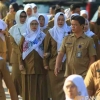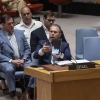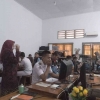The uncontrollable influx of refugees in Europe in the early of 2015 marked the beginning of the European refugee crisis. Wars in Iraq and Syria, authority breakdown in Afghanistan, Iraq, and Eritrea, compounded with unrest in Africa have spurred an exodus of refugees. The influx of refugees is majorly comprised of those originated from Syria, followed by Afghanistan and Eritrea. With the total of 20 millions of people forced to flee their home countries, history notes this as the highest number of mass movement since the World War II.
According to the UNHCR, refugees are people fleeing conflict or persecution and under the international law, they must not be expelled or returned to situations where their lives and freedom are at risk. This explains why the whole world citizens are bound to the legal and moral responsibility to extend necessary assistance to them. It is never under their willingness that they risk their lives riding a boat across Mediterranean Sea to ask for help, or reside in the refugee camps longing for aid since they get no chance to enter the workforce. They have never asked to live as refugees.
The certain matter that possibly occupies refugees' minds is merely how to stay alive. Let alone being able to live a decent life, even being able to stay alive seems questionable. They are confronted with 1001 walls---barriers---which make it distant for them to pursue a decent life.
The very first time they left their home countries for good, they chose the neighboring countries such as Jordan, Lebanon, and Turkey with hope that once the conflict is settled, they might be able to go back to their home countries as soon as possible. Regrettably, their hopes seem to fail them as the conflict is still raging on up until now in those conflicting countries and even gets more complicated. Then, as if the affliction is not enough, they were confronted with the bitter truth that they had to live in the overcrowded-yet-underfunded-and-undersupplied refugee camps in those neighboring countries which somehow subjecting them to cold, hunger, and diseases. This happened because the United Nations Refugee Agency and United Nations World Food Programme were not prepared to handle this scale of refugee crisis. To make it worse, refugees who were settling in those neighboring countries couldn't acquire lawful employment, decent housing, nor permanent residence. Since refugees seem to lose hopes, they started evaluating the other destination countries which appear to be possible options
Geographically, Arab Gulf States are within reach from the conflicting countries. Unfortunately, they refused to take the refugees in because they are not the signatories of 1951 UN Refugee Convention. Therefore, they are not obliged to provide treatments and uphold the rights of those who seek refuge. However, Saudi Arabia, one of the Arab Gulf States, claimed that it has welcomed 500,000 refugees by the end of 2016 and had provided them with decent healthcare, education, residency, and right to work. Besides, it also claimed that it had given millions of dollars of monetary support to help the funding of the refugee camps abroad. This was confirmed by the UNHCR's representative to the Gulf region. The refugees intake was absent during the counting mechanism by Amnesty International and Brookings Institution because back to the bottom line: Arab Gulf States aren't the signatories of the UN Refugee Convention, while the counting mechanism only recognize those who had signed the Convention. That's why many sources who used the result of counting mechanism by Amnesty International and Brookings Institution as the base of argument told that Arab Gulf States, despite the wealth, take z-e-r-o refugees. Despite the fact, however, a lot of parties still urge Arab Gulf States to take in more refugees because tackling the refugee crisis by only donating dollars in checks with a lot zeros on them doesn't particularly mean that they had addressed the main issue: where these refugees should reside. What is the point of having bucks of money if refugees cannot arrive alive at the destination countries?
After crossing Arab Gulf States off the list and recognizing the overcrowded refugee camps in the neighboring countries, Europe appears to be the remaining possible option. The possibility to seek for asylum in Europe plus the opportunity to get jobs and rebuild their lives once their asylum applications are accepted seem to draw fresh hopes to the refugees. However, one more wall blocks them from pursuing a better life. In order to reach Europe, they have to risk their lives sailing across the Mediterranean Sea, while the facilities are limited. Refugees often sail across the sea in the overcrowded boat, so they are really prone to the risk of sinking or being capsized. By the end of 2016, the death toll in attempt to cross the Mediterranean Sea surpassed 5,000 lives. This means that on average, 14 people have die every single day in Mediterranean trying to find safety or better life in Europe. Despite anything, they still believe that Europe is worth the risks.
Those who arrived on Europe should follow the asylum application mechanism to be granted asylum. Once accepted, they would able to live as a legal immigrant in that country. They can't be sent back to their home countries as long as they have the asylum status. The asylum status also granted rights for the legal immigrant to get the right to work. But, as the asylum applications and number of refugees continued to grow, worry started to grow in the Europe. Some countries feared that welcoming more refugees would threaten the sovereignty of their countries. For this reason, more "walls" were built to block refugees from having a decent life. Countries like Bulgaria and Macedonia started to build razor wire fence; UK closed the motorways, ports, and rail links; Hungary closed the border with Serbia; even some Schengen countries such as Austria, Germany, Denmark, and Sweden---which had agreed to apply free movement within the territory without border checks---in the mid of 2016 applied border checks. They did that in order to control the influx of refugees which seemingly grew out of hand.
While the refugees who hadn't entered Europe were facing the barrier to get inside, those who had entered Europe were facing barriers to integrate with the society. The major barrier is language barrier. Refugees who are mostly originated from Middle-East spoke Arabic, while most of the EU countries are English-speaking countries. Although the opportunity to work is opened, they couldn't practice their professional competency if they cannot communicate. After the traumatic experiences the refugees have gone through, learning a foreign language turns out to be much more difficult. Some suggested language courses to tackle this "wall" down, but more "walls" are built up. Language courses are often costly and the human resources as the tutors are insufficient.
Besides language barrier, Islamophobia also hampers the refugees from integrating with society. Slovakia authorities bluntly stated that Moslems wouldn't feel at home, so they only accept Christian refugees. The media also plays role in building the "walls". Negative portrayals of refugees in the media and publications correlating Islam to terrorism seem to slow down the process of refugees being integrated to the society.
All of these explanations are meant to elaborate that even after facing a life-threatening situation back in their home countries, Middle-East refugees still have to break 1001 walls down in order to pursue a better life. After they find way to break one barrier, another one appears, and it goes on and on. Since they left for the first time, they had to designate the possible destination countries. They had to find the way to reach there: walked for days, crossed the sea in an overcrowded rubber dinghy, or illegally rode a lorry. Once they reached the destination country and took a few breathe, they had to move to another country either because the residence permission is temporary or the living situation is inadequate. From neighboring countries, they went to Europe. After they reached there, they had to apply for asylum. If not accepted, they couldn't get the facilities of legal immigrant. If accepted, they'll bump to the barrier of integrating with the local citizens.
This refugee crisis wouldn't stop until the war ends. As the war is raging on, some parties are blaming each other. EU countries stated that Arab Gulf States should stop being ignorant wealthy cowards, while the Arab Gulf States said that EU countries only took refugees in for the sake of political benefits. Both of them brag about the contributions they've done in tackling the refugee crisis. That being said, this world doesn't need to rank who've given the most to this refugee crisis. This world needs all of the countries to come together, working hands in hands, and stop pointing fingers at each other. Because while the debate goes on, more lives are gone.








